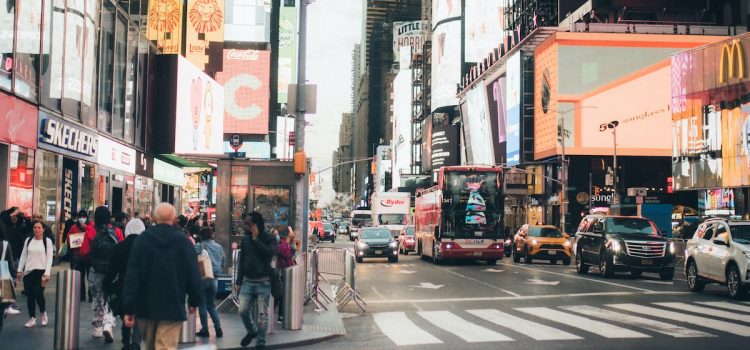

This article is an excerpt from the Shortform book guide to "The Comfort Crisis" by Michael Easter. Shortform has the world's best summaries and analyses of books you should be reading.
Like this article? Sign up for a free trial here.
How do city sounds and the sight of strangers affect people? How is rain a mood booster?
Modern cities offer us many benefits. But, urban environments have removed us from the discomforts of the natural world that we belong to, and this has a variety of harmful consequences.
Read on to learn Michael Easter’s research on the disadvantages of urban life and the benefits of getting back to nature.
The Disadvantages of Urban Life
According to Easter, our pull to the city is a natural result of our evolutionary instincts to live in an environment that’s rich with survival resources and mating opportunities. However, urban comforts remove us from the natural environment we started in. The disadvantages of urban life include a swath of health issues and the absence of many psychological and physical benefits. Easter references research showing that people living in cities are 21% more likely to suffer from anxiety and 39% more likely to have depression than people living in rural areas.
(Shortform note: Another drive to the city is the human instinct to immerse ourselves in new environments and learn. If you live in the city for these reasons, you may be what experts call an urban culturalist. Urban culturalists are typically more satisfied with urban living than urban materialists (those who seek the wealth and luxury often found in cities. This is because cultural pleasures are shown to consistently improve happiness, whereas material pursuits are susceptible to hedonic adaptation, which is the theory that the more material goods you have, the more you want. This happens because each material gain widens the gap between your desires and possessions, which makes you increasingly dissatisfied.)
Easter says high population density and noise contribute to chronic mental health issues and unhappiness. He references research showing that, for most of human history, our ancestors lived in groups of about 150 people or fewer. This is called Dunbar’s number, after the anthropologist Robin Dunbar who discovered this population sweet spot. According to him, a group of 150 people is big enough to adequately protect itself, gather resources, and share. However, when communities exceed this number, it becomes difficult to maintain close relationships and cooperate. Anthropologists argue that, even today, our brains are programmed to prefer a lower population density, and, when we’re surrounded by unfamiliar faces in urban environments, this stresses us out.
(Shortform note: Although Dunbar’s Number is frequently cited and even implemented as a model by companies for office sizes, recent research has shown that the size of our social networks is much more variable. Dunbar based his limit of 150 relationships on primate brain science and group behavior. However, updates on primate research reveal that primates base their group sizes on very different needs than humans do, such as for defense against certain predators that we don’t have. Additionally, studies show that human social groups range widely, from two people up to 520. Researchers explain that this is because our social groups aren’t limited to our genetic hardwiring, but they’re instead influenced by cultural evolution.)
Along with population density, city soundscapes cause us stress, which can lead to a variety of illnesses, such as depression and heart problems. Easter explains that this is because humans started out in natural environments that were relatively quiet most of the time. Any loud noises in nature typically indicate danger (for example, a tree limb cracking above your head or a bear growling at you). So, we register the constant commotion of cities as threatening, which translates to chronic stress reactions that have several damaging effects on our well-being.
(Shortform note: Urban noise has also been shown to have a negative impact on children’s ability to learn language. For example, one study found that children exposed to loud urban noises had more difficulty differentiating between similar-sounding words, mastering new words, and reading. In response to our biological need for a quieter environment, some cities have implemented sound-reducing structures, such as sound barriers to reduce highway and railway noise, thicker insulation in buildings to absorb more noise, and adjustments in airplane flight paths to prevent intrusions from above.)
Comfort Remedy: Get Out in Nature
Spending time outside counters the costly comforts of city living. According to Easter, after only 15 minutes in nature, feelings of anxiety, depression, and anger are reduced.
Here are a few of Easter’s tips to spend quality time in nature on a weekly, monthly, and yearly basis:
- Every week, take at least three nature breaks for 20 minutes or more, even if it’s just in a city park. This significantly reduces stress, as well as makes you more productive and creative at work.
- Every month, spend at least five hours in “rural” nature. This means getting out of the city and into the countryside.
- Every year, take at least one three-day trip in “wild” nature. For Easter, wild nature means there’s no sign of civilization in sight and you have little to no cell phone reception. He references research that shows three-day trips alter our brain waves by the third day from beta waves to alpha and theta waves. Beta waves are your focused, nervous waves that reflect busy, stressed feelings. Alpha and theta waves are associated with relaxation, flow, and an overall boosted mood.
| Is It Still Beneficial to Experience Nature in Poor Weather? Following Easter’s advice for weekly and monthly nature visits may feel more challenging during the winter months because, well, who wants to head to the city park when it’s snowing or raining outside? However, you might want to rethink that instinct to hunker indoors, because experiencing poor weather provides mental health benefits. For example, research shows that, when raindrops collide with oils produced by plants, it releases sweet-smelling compounds into the air. This is called petrichor, which is a combination of the Greek words for “stone” and “blood of the gods,” and they enhance our mood when we breathe them in. Additionally, when the rain and air molecules collide during a rainstorm, it ionizes the air, which has been shown to improve respiratory health and immunity. For example, one study that observed the respiratory health of hikers in the Alps found that ionized air had bolstered a beneficial antibody throughout their respiratory tract, resulting in more robust immunity overall. So, embrace the rain, and enjoy nature all the same! |

———End of Preview———
Like what you just read? Read the rest of the world's best book summary and analysis of Michael Easter's "The Comfort Crisis" at Shortform.
Here's what you'll find in our full The Comfort Crisis summary:
- Why a modern, comfortable lifestyle is bad for health and happiness
- Why discomforts such as being in nature, fasting, and exercising are important
- Tips on how to make discomfort your friend






